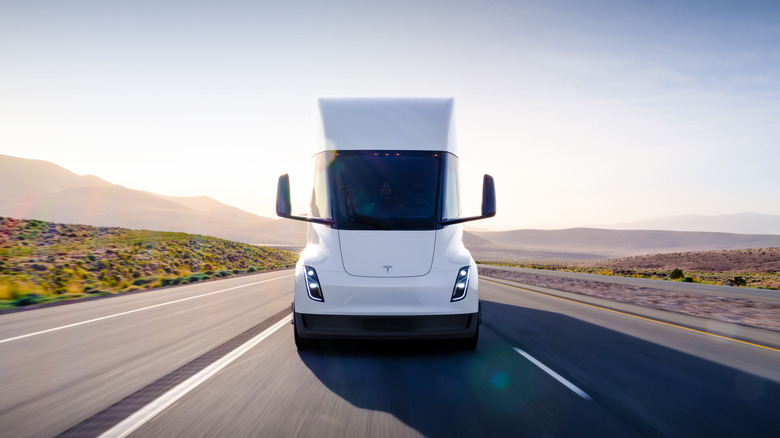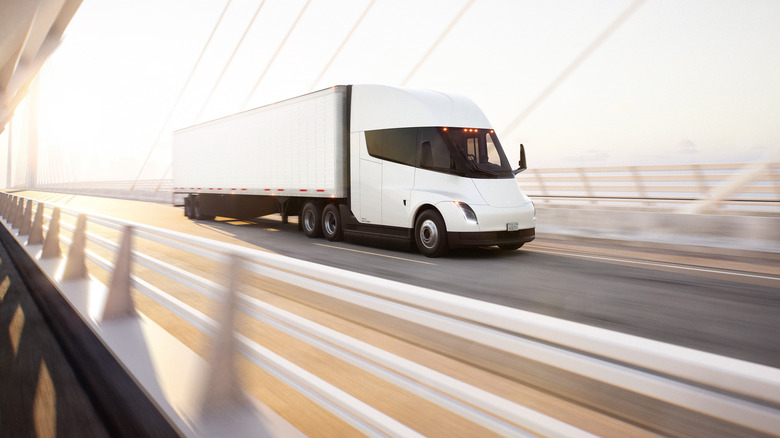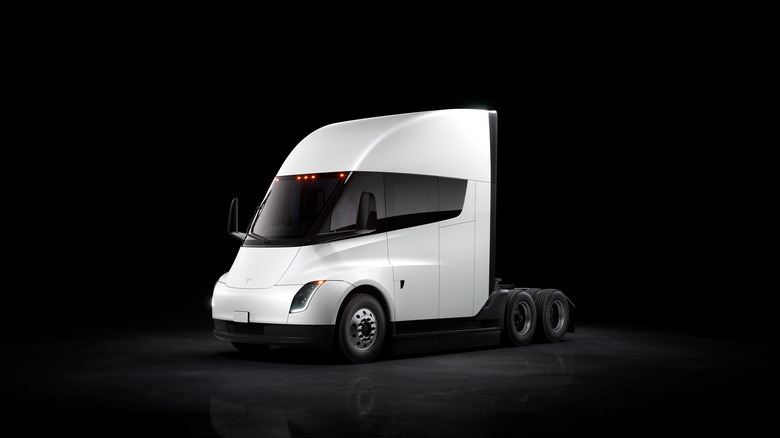Tesla Semi Recalled Due To Parking Brake Issue
The Tesla Semi is facing a recall due to an issue with the vehicle's parking brake. According to the NHTSA, the issue relates to certain "parking brake valve modules" installed within the trucks. The safety administrators say the electronically controlled brake "may intermittently fail to transition when the parking brake is engaged or disengaged." This means that the brake might not engage when the driver tries to engage it, which is obviously an issue on a vehicle that weighs 81,000 pounds. The documents say that the problem seems to be caused by "excessive internal air leakage" which prevents the pneumatic brakes from building up the pressure they need to engage properly.
To resolve the issue, Tesla is going to replace the affected parts of the parking brake. New trucks will also have "improved internal components that prevent air leakage," so it's unlikely this issue will arise in vehicles manufactured after March 15. Based on manufacturing records, the NHTSA believes 35 trucks are affected by the problem. It is unknown how many Tesla Semis have been sold, so it's impossible to gauge what percentage of the vehicles were affected by the braking issue. However, the truck was only launched in December of last year, so there may not actually be that many on the road.
The first bump in the road for Tesla's high-powered truck
This is the first major post-release problem Tesla's heavily hyped truck has faced. The vehicle was delayed several times, before eventually being released in December 2022. Pepsi received the first vehicles and ordered around 100 of the trucks pre-release. The truck's specs are pretty impressive. Tesla says its 1,020 horsepower semi can go from 0-60 in just over five seconds while unladen. At full capacity, that takes around 20 seconds — but that's not bad for something towing 80,000 pounds. It has a range of 530 miles, though it can eke out 600 if you're traveling without a load attached.
Tesla's semi is also a lot more accessible and easier to drive than traditional trucks — and it's not just driver assistance software making things simpler. Trucks tend to have a large number of gears, with 18-speed transmissions being very common. Drivers have to navigate these gears as the truck takes on hills and other gradients along the journey. Being electric, the Tesla Semi doesn't have a gearbox. Everything is handled by the motor, and the trucker using it has a far easier trip.
Tesla recalls are nothing new
Like every other auto company, Tesla has issued its fair share of recalls. Most of those recalls aren't as potentially serious as a failing parking brake on an 81,000-pound truck. Some of the other recalls are also more easily solved. A lot of the time, one of Tesla's "over the air" updates takes care of the issue. So if your vehicle is connected to the internet, you can just ignore the problem and the issue will resolve itself when the relevant software update eventually rolls out to you. Some of the recalls are also so trivial that Elon Musk has suggested we need another word for them. He described the terminology as "outdated & inaccurate," and suggested something else should be applied to recalls that cause no injury, pose little danger, and are fixed by a small software update.
In terms of actual danger, Tesla's "recall-worthy" problems have ranged from problems caused by obnoxious speaker systems to windows that could pinch a driver's limb, all the way to self-driving software that has allegedly played a part in a number of serious car accidents. Over 360,000 affected vehicles were flagged last month, and the owners should be notified by mail sometime before April 15. The self-driving issues, like many other issues, are also being solved with a software update.


